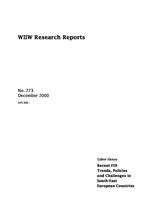Recent FDI Trends, Policies and Challenges in South-East European Countries
wiiw Research Report No. 273, December 2000
49 pages incuding 25 Tables and 3 Figures
One of the aims of the internationally funded Investment Compact of the Balkan Stability Pact is to reduce investment risk in the region and lay the foundations for the inflow of private capital. This paper discusses the situation of foreign direct investment (FDI) in South-East European countries (SEECs). It also draws lessons from the experience of Central European transition countries (CEECs) to make conclusions and policy recommendations for SEECs. It provides an insight into some crucial areas - foreign penetration in the manufacturing sector, FDI-related policies and privatization as a vehicle of FDI.
The paper comes to the conclusion that the countries can transform and grow faster if they rely on foreign direct investment. The pace of restructuring has been fastest in countries where FDI was attracted also by privatization. Technologies relevant for growth are principally developed by multinationals and can only be accessed within their networks. A comparison of the performance of domestic-owned and foreign-owned enterprises in CEECs proves the overall positive effects of FDI in terms of structural upgrading and increasing competitiveness. But foreign direct investment inflows cannot be treated as unrequited transfers: they finance profit-oriented ventures whose foreign owners expect to realize and, to a smaller or larger extent, also to repatriate the generated profit. Current account deficits are in part produced by FDI inflows.
The experience with public policies in SEECs has been disappointing for reasons connected with weak states and corrupt practices. Strengthening public institutions and building credibility can be development targets of their own. In the given situation, policy recommendations must keep in mind that these countries can only cope with simple policies; they are unable to run very sophisticated programmes or apply complicated tools. In the future, supporting regional re-integration and easing border controls can reduce transaction costs and increase the size of attainable markets. Investment promotion policies must become more stable and transparent. Restructuring and privatization of ailing industries, restructuring and capitalization of the banking system as well as policies directed at the promotion of small and medium-size businesses are necessary to strengthen market-economy rule. The legal system must become more transparent and less corruptible. Simple legislation and institutions (smaller governments) are usually less corruptible than more complex, fuzzy ones.
Keywords: foreign direct investment, CEECs, SEECs, Balkans, economic policy
JEL classification: D200, L500, L600, F200, F400
Countries covered: Bosnia and Herzegovina, Bulgaria, Croatia, Romania, SEE
Research Areas: International Trade, Competitiveness and FDI, Sectoral studies
